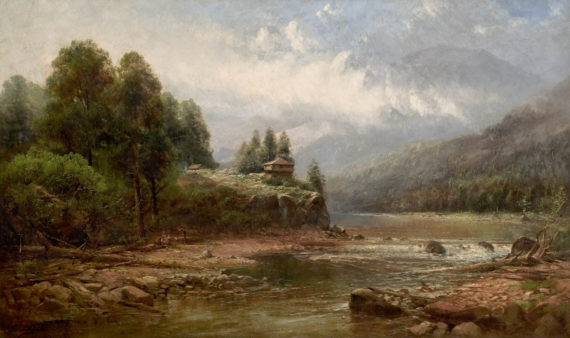I am not from where I live, yet I have a deep fear that where I live won’t be where I live for very much longer. The god of progress bears down on our town like cavalry upon the steppes. There is not a whole lot one can do outside of seeking divine intervention, much like a Magyar farmer in the Fifth Century praying away the hordes. Yet, the Southern tradition is if anything experienced in this kind of world, always being put upon by forces outside its immediate control. I know for many of us who find comfort and peace in this tradition there is a concern that we are fighting a battle already lost, watching as a project began in the tidewater of Virginia four hundred years ago slips into the night.
Many of the articles and essays that I read come to a similar conclusion, but their solutions are born out of the same materialistic American world and life view that has brought the plague upon us, seeking hope in the levers of government and PAC’s. It is my opinion that these attempts are abortive because they rest on faulty philosophies and consumerist mindsets that lead to the blobs gobbling up the countrysides hard worked by many of our ancestors.
The real answer to this dilemma is cultural as much as it is political. Those of us on the outskirts of one of the many burgeoning metropoli that are multiplying in the sun belt have a decision to make. If we cannot picket the latest tract of NPC housing or attempt to intercede with a local planning commission who have had their eyes taken in by the siren song of money then we can do no other than become ready and able to outlast this onslaught that is bound for an early grave, especially as things spiral in these late stages of our republic.
We must become the example for our children to follow, for Southern conservatives must take on the mindset not of decades, but of centuries. These metal beasts and financial dragons will not be slayed in our days completely, unless providence intervenes. We should be working so that the world in which our children’s children will rise may be a time of reconquista and reestablishment of an older way of life in the ruins of this material world. We must be readying them for that time, laying the seeds which will flower in their course. So, the question becomes how do we go about doing that?
It starts with the soul. By that I am speaking quite literally, not in some sophomoric philosophical way, but in the very metaphysics of what it means to be human. Our forefathers were men of religion, even if not evangelical in their faith. We know of Thomas J. Jackson’s indomitable spirit born of his deep belief in the hand of God over all and it is an assured truth that late in his life the unrelated Andrew Jackson drew on the catechism lessons his mother learned him as a young boy.
Spiritual formation is as much about the creation of a way of approaching the world, understanding yourself as an inheritor of a great tradition who is granted the privilege of bearing it up for the next generation as it is for the propagation of sectarian faith. However, being a man’s whose job it is to proclaim the gospel hope I also don’t believe that these things can be separated from themselves.
Any real desire to recapture the depth of the Southern tradition must begin with the heart of the biblical heritage brought into the back country of South Carolina, or the hills of Tennessee by our relations. It was this deep appreciation for the hard work their own forefathers had put into throwing off the chains of ecclesiastical tyranny that allowed them to understand the real fruits of liberty and freedom. Yet, they understood that for a man to experience the blessings of these gifts they had to have their own fleshly desires under control.
Many of the greatest examples of Southern literature feature heroes who understand that the greatest danger to any man was himself. This is why any group of people seeking to give a renewed place to an older way of life must return back to the old paths which led those men to a way of life we seek to emulate. It has to start here, for any edifice is only as strong as its foundation and a man’s spiritual life is the true measure of who he really is.
Next comes the way we live. I don’t mean here primarily ethics, though that is part of the picture, what I am really looking towards is the goals we have for ourselves and our families. We all want our children to be successful, but how we measure that makes all the difference. In the introduction to I’ll Take My Stand the authors write these words:
“The younger Southerners, who are being converted frequently to the industrial gospel, must come back to the support of the Southern tradition. They must be persuaded to look very critically at the advantages of becoming a ‘New South’ which will be only an undistinguished replica of the usual industrial community.”[1]
The only response to this quote is how has this turning to the “industrial gospel” gone for the people of the South? How has it benefited the way we would like our culture to be and to act? Are we better off with aforementioned tracks of land being taken in by the expansion of the mega city? I think by any rational line the answer would be no, we are not. Do we have more stuff? Sure. Do we have professional sports in Charlotte, Atlanta, Houston, Dallas, New Orleans, Nashville, and Jacksonville? Yes. But what has this provided for us, but loss of community and distinctions that once mattered. Was it worth all we had to steal from our grandchildren to get it? The answer should be obvious, and if it is not, well then we see what we are up against moving forward.
If we want to see the goals of Southern Agrarianism realized we need to consider how much about our patterns of daily life are organized around the very barbarism Davidson warns about, and that the Twelve wanted the young men and women of the South to flee from. What example are we giving our young people and how are we preparing the next generation to continue to move the torch down the passages of time? It begins with our own heeding of the call in the aforementioned paragraph. We must apostatize from the industrial gospel, repent of our materialistic hedonism, and turn once more to the settled, and careful ways of the past. For that is where the real success of the future lies.
Wendell Berry writes in his essay on Energy in Agriculture from the collection Bringing It to the Table that:
The farm and its household were “poor” by our present standards, taking in very little money, but spending very little too, and that is the most important thing about it. Its principle was thrift. Its needs were kept within the limits of its resources.[2]
It is that last clause that I want to end this essay with. How important are limits to you? What do you see as the benefits that they bring? I’d say that one of the greatest challenges we face is that we have yet to get serious about this project. It is all well and good to rail against the Yankees, and the half-backers filling up our cities, or the liberals in Washington, but what are we doing to create a world in which we can see the true flourishing of the hopes and dreams of not just the Nashville poets, but of the kind of society envisioned by John Taylor of Caroline in Arator. A place where the yeoman farmer had enough personal dignity and self-assurance that it didn’t really matter what happened up in the District, for he had all he needed to succeed where he was.
Is this what we really want? Or is the goal just to be the Statler and Waldorf of the great American decline? It is time for us to do something, by beginning with the little things that will make all the difference down the road.
[1] Ed. Twelve Southerners, I’ll Take My Stand (Baton Rouge: Louisiana State University Press, 2006) xlii-xliii.
[2] Wendell Berry, Bringing It to the Table (Berkeley: Counterpoint, 2009) 57.







